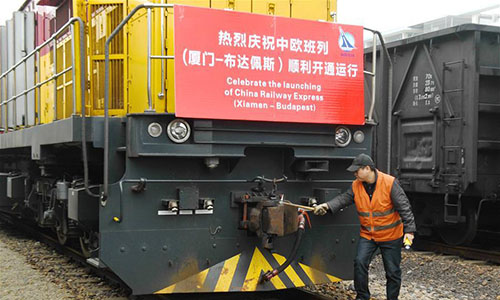Economic diplomacy making progress at dawn of new era

A staff member checks a new freight train of the China Railway Express, which links the port city of Xiamen in Southeast China's Fujian Province with Budapest, capital of Hungary, before its departure at Haicang Station in Xiamen on Jan. 19. The “China Railway Express” service, regarded as the “Belt and Road on rail,” helps boost economic connectivity between China and the rest of Eurasia.(PHOTO: XINHUA)
At a recent symposium, scholars highlighted China’s achievements in economic diplomacy in the past five years, summarized its characteristics and shed light on new steps the country is taking in the field.
The Symposium on the Situation and Prospects of China’s Economic Diplomacy under the Framework of the New Model of International Relations was held on Jan. 7 in Beijing. The meeting was also the 2018 annual conference of the Society of Economic Diplomacy at the China National Association for International Studies (CNAIS).
At the symposium, Zhu Caihua, deputy chairman of the CNAIS, summarized China’s economic diplomacy in 2017.
In early 2017, Chinese President Xi Jinping delivered the keynote speech at the World Economic Forum in Davos, stressing the importance of an open world economy and a dynamic innovation-driven growth model featuring open and mutually beneficial cooperation, fair and equitable governance as well as balanced, equitable and inclusive development.
His speech instilled confidence into the international community, pointing out new directions for economic globalization, Zhu said.
The first Belt and Road Forum for International Cooperation, a high-level, large-scale multilateral diplomatic event proposed and hosted by China in May 2017, blazed new trails for rebalancing economic globalization, Zhu noted.
And the BRICS Xiamen Summit in September 2017 marked the beginning of the second “Golden Decade” of BRICS cooperation, ushered in the “BRICS Plus” model and for the first time, invited leaders of representative emerging economies and developing countries, building a new influential platform for South-South Cooperation, Zhu added.
The highlights of China’s economic diplomacy were not limited to 2017. Li Wei, an associate professor of international relations at Renmin University of China, outlined the progress in economic diplomacy since the 18th CPC National Congress.
The steady advancement of the “Belt and Road” initiative is noteworthy, followed by the establishment of the Asian Infrastructure Investment Bank and the accession of Western countries like the United Kingdom, Li said.
Coping with new changes in international trade, China actively promoted negotiations on regional comprehensive economic partnerships, reached free trade agreements with South Korea and Australia, and launched the Asia-Pacific Free Trade Zone, Li said.
China succeeded in reforming international financial institutions, including the incorporation of its currency into the basket of the Special Drawing Rights (SDR). Remarkable results were also achieved in economic diplomacy with the United States, such as the China-US Comprehensive Economic Dialogue mechanism and US President Donald Trump’s signing of business deals worth $250 billion during his visit to China, Li said.
China’s economic diplomacy is vital to the country’s push to build a new model of international relations, said Dai Changzheng, dean of the School of International Relations at the University of International Business and Economics.
Advocating fairness, justice and mutual benefit, the Chinese model of economic diplomacy is highly flexible and does not discriminate against any ideology or social system, Dai said. Also it is inclusive, open and emphasizes the principle of achieving shared growth through discussion and collaboration, which distinguishes it from Western economic diplomacy.
Under the framework of the new model of international relations, new trends and topics in China’s economic diplomacy were a common concern of attending scholars. Zhang Min, a research fellow from the Institute of European Studies at the Chinese Academy of Social Sciences, said that economic diplomacy has embraced a growing number of new elements with the development of economic globalization and constant changes in traditional models like trade, investment and aid.
Scientific and technological innovation is an important new element, Zhang said. The report to the 19th Party congress proposed making China a country of innovators, identifying innovation as the primary driving force behind development and the strategic underpinning of building a modernized economy, so innovation should be a priority of economic diplomacy in the new era, Zhang added.
In this regard, China and Europe have laid a solid foundation in science and technology cooperation, Zhang said, calling for more efforts to strengthen economic diplomacy through scientific and technological innovation, active participation in the European Union’s “Horizon 2020” projects, and implementation of China-UK Science, Technology and Innovation Cooperation strategies.
The symposium was hosted by the Society of Economic Diplomacy at the CNAIS and organized by the School of International Relations and the Research Center for Economic Diplomacy at the University of International Business and Economics.

 PRINT
PRINT CLOSE
CLOSE